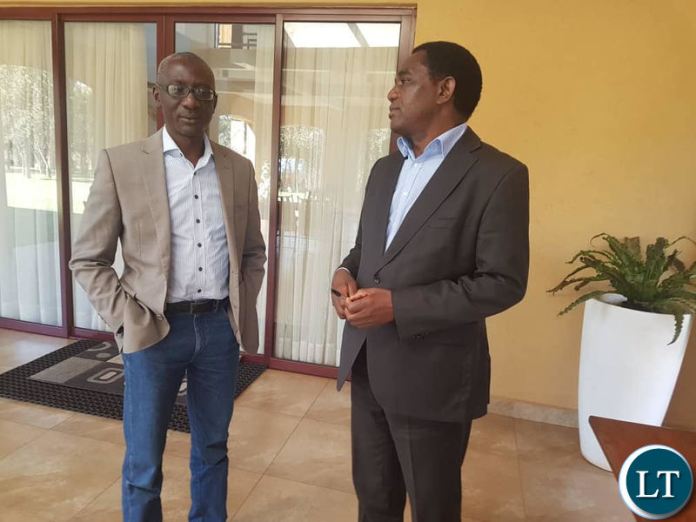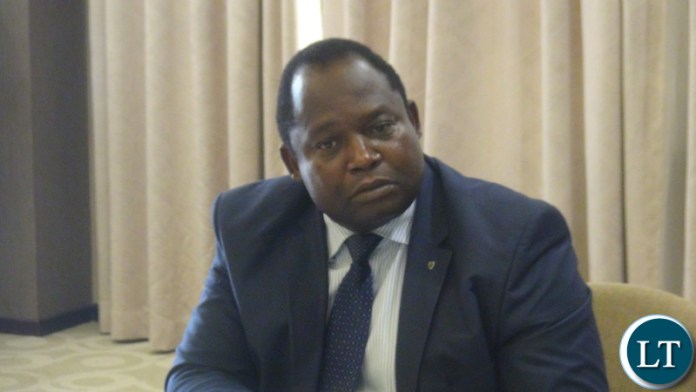
By Sishuwa Sishuwa
A weekly column such as this one does not exist on its own. It requires the support and interest of readers, the understanding and permission of editors, and a steady stream of new political material to write upon. I am very grateful that none of these things appears to be in short supply, but with a note of sadness I must announce that this is my final column, at least for the time being. Most of you will be aware that I am not a fulltime newspaper columnist; my main occupation is lecturing at the University of Zambia. I regrettably anticipate that the deteriorating state of our public finances will cause this job to become more challenging over the course of the next few years and it is to this increasingly demanding job, of educating a new generation of Zambians, that I must now devote myself.
Alongside teaching, I would like to do my part in advancing Zambian scholarship. Much of Zambia’s political history, even recent history, remains unknown or poorly understood. Processes of political change and the extraordinary transformations that have occurred in our country over the last one hundred and fifty years deserve greater attention, something which the time demands of this column, combined with my heavy teaching responsibilities, do not presently permit. I will continue to write but in a different format and on other platforms.
There are those who will doubtless suspect that I have been bought off in some way or intimidated into silence by the governing Patriotic Front (PF). I would like to assure you that this is most certainly not the case, though I recognise that both possibilities are regrettably all too real in our present climate where many critics have been co-opted into the ruling party and the government has both clamped down on civil liberties such as freedom of expression and harassed political opponents. I have personally received chilling threats on my life from supporters of both the PF and opposition United Party for National Development (UPND) during the year-long course of this column for the crime of expressing a dissenting view, but my decision to cease my weekly commentaries emanates not from such risks. Those who know me well will testify that I am neither corruptible nor easily intimidated by any authority, human or divine. My decision draws solely from the need to deepen my analysis of academic investigation or to concentrate, at least for now, on my scholarly work, which mainly involves teaching and research.
In any case, I never intended to continue this column indefinitely. I started it out of a deep conviction, motivated by the belief that if specialist knowledge is worth acquiring, it is also worth sharing. Zambia lacks a public intellectual culture and I began this column in the hope that in my own modest way I could contribute to the creation of one. I hope I have made a contribution. I also started this column out of a desire to contribute to the protection of a critical free press, a vital element of any functioning democracy. Zambia’s once vibrant tradition of private media had been almost totally stifled when News Diggers was founded as a tentative effort. Following the closure of The Post, the only remaining major private newspaper outlet largely adopted a pro-government position. I am pleased to say that News Diggers, thanks to its youthful editors and reporters, and many other contributors, is now thriving and is easily the most credible and informative of Zambia’s many daily newspapers.
I also never intended to continue this column indefinitely because the work of providing political analysis, criticism and reflection is not mine alone. As earlier stated, I hope that others will step forward, something especially necessary at this present time when our politics, like the society that produces it, is so polarised that independent and impartial professional commentary is rare in our political discourse. Other educated Zambians, especially those attached to university faculties, must utilise this new non-partisan platform and make their voices heard on numerous public issues that are crying for critical commentary and expert analysis. A key reason for the collapse of Zambia’s moral fabric and its dysfunctional institutions is the timidity, lack of action and complicity of the intelligentsia and educated elites, many of whom are ever prepared to compromise values over relationships and personal gain. This scenario should change. Zambia today is in greater need of brave citizens and many voices of enlightenment – and I am confident that new columnists will emerge in time to write regularly. I believe that human intelligence, and consequently enlightenment, is a product of the human collective. It is invariably greater than our individual intellect and efforts.
Finally, some thanks are in order. I began this column by noting three necessary ingredients for its success. I would therefore like to first thank my readers for their interest, for regular feedback and for their support. Second, I would like to thank the editors of News Diggers, especially Joseph Mwenda and Mukosha Funga, both for the opportunity to write this column in the first place and for their general support when it has touched controversial subjects.
Lastly, I would like to thank the PF government and especially President Edgar Lungu whose careless utterances, tolerance for corruption and sheer incompetence, for instance, has meant that I have never been short of material to write about. I would also like to thank Lungu’s hopeless counterpart Hakainde Hichilema, whose manifold weaknesses and tragic ineffectiveness has allowed the failed PF experiment to last this far.
Tough times are ahead for Zambia and I fear that there will be much to write about for any new columnist. Our government has accumulated an unsustainable burden of debt with little to show for it. Clearly, much of the money borrowed has been wasted or stolen. Nevertheless, it will have to be repaid and I am afraid that government finances will become tighter, as we struggle to dismantle the mountain of debt that has formed since 2012. As government expenditures decline, temptations on individuals to engage in corruption will only increase. Public investment in social sectors like education and health will decrease considerably, setting in motion a devastating process whose output will be a disease-ridden, impoverished and illiterate national population. Zambians, sadly, are not unfamiliar to these events and the fact that the actions of our government have brought us here again is sheer madness.
The debt service situation is already very serious, absorbing 33 per cent of government expenditure in interest payments, as of March 2018. When the repayment of the principal debt itself begins next year, the situation will only deteriorate, possibly triggering civil unrest. Yet our national leaders appear to trivialise the debt issue and the tragic failure to invest the borrowed funds into social sectors such as education and health. Only recently, Alexander Chikwanda, a man who should take his share of the blame for the excessive debt build-up, which began on his watch, claimed that ‘those criticising the government for investing in infrastructure development do not mean well’. I do not know anyone criticising infrastructure development. What is being criticised is (a) poor project selection, with low priority investments (especially roads) in parts of the country where traffic levels are low; (b) overpriced contracts (e.g. Lusaka-Ndola road) many of which are clearly corrupt; (c) neglect of rehabilitation and maintenance. The poor state of public investment planning and implementation is clearly documented in the Public Expenditure and Financial Accountability report, co-authored in part by the Ministry of Finance. Anyway, the time will come when the apparent complacency of the government will be shaken, when it will no longer be possible to conceal the enormity of the challenges before us.
Zambia needs collective action and strong institutions to survive the coming storms. At present, the presidency of Lungu, rather than easing the country’s complex challenges, appears to be Zambia’s foremost danger, at least in the short-term. It has helped entrench deep ethnic divisions, foster corruption, which now threatens to eat away the little that we have achieved, and has largely succeeded in undermining the Constitution and destroying the vestiges of autonomy in the very institutions that our fragile democracy so desperately needs – a judiciary that is not susceptible to political and financial interests, a truly functioning Parliament, a viable political opposition, a critical free press, a strong civil society, an independent Electoral Commission, a professional police service, and an effective Anti-Corruption Commission. Much remains to be debated and discussed about our national future. I would hope that our next political debates are about how we create functioning institutions and mechanisms to scrutinise the conduct of government and prominent political figures.
I know, however, that raising such critical institutions will not be easy. Institutions that sustain any system of governance cannot be build on debt and an apathetic, cowardly and completely pacified population. The tough work must be done first: we Zambians must throw off the heavy and oppressive colonial mentality of a pacified and frightened people, and demand that those who must preside over us must account to us. This is the first struggle on our hands. I am not sure whether the misery that awaits us when the massive debt matures will be sufficient – without public intellectuals leading the ideological charge for a new society – to awaken the revolutionary character in us Zambians.
Vladimir Lenin wrote in March 1913: ‘People always have been the foolish victims of deception and self-deception in politics, and they always will be until they have learnt to seek out the interests of some class or other behind all moral, religious, political and social phrases, declarations and promises. Champions of reforms and improvements will always be fooled by the defenders of the old order until they realise that every old institution, how ever barbarous and rotten it may appear to be, is kept going by the forces of certain ruling classes. And there is only one way of smashing the resistance of those classes, and that is to find, in the very society which surrounds us, the forces which can – and, owing to their social position, must – constitute the power capable of sweeping away the old and creating the new, and to enlighten and organise those forces for the struggle.’
Lenin did not have today’s Zambia in mind when he wrote these words, but I think that they best capture how we are going to get ourselves out of the mess we have sunk into. In our circumstances, this requires igniting a broad and popular movement that can and must give birth to millions of leaders who can perform the revolutionary surgery we are urgently in need of, nurse the country back to its full health, and sustain it in that state. Given that the leadership of our main political parties is cut from the same cloth as our lumpen middle class and is practising a politics that is not based on mass mobilisation, who will lead the struggle for some Zambian ‘renaissance’ of some sort? Who will identify ‘the forces which can – and, owing to their social position, must – constitute the power capable of sweeping away the old and creating the new, and to enlighten and organise those forces for the struggle’? In other words, how best can we, as a people, prepare ourselves for the storms ahead and work to generate some kind of national intellectual and cultural revolution, during these pre-revolutionary days?
I will return. Until next time…
Source:News Diggers































